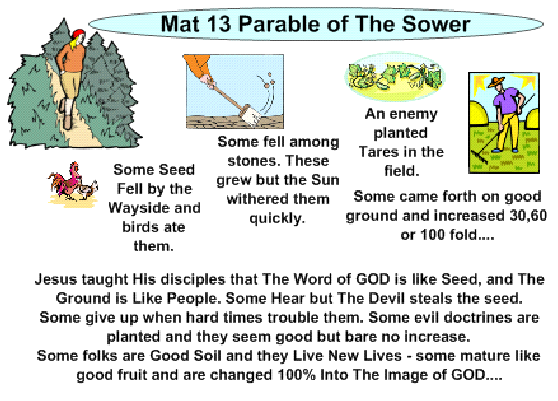© SeventhDayChurchOfGOD.NET 2014

Parables in Matthew:
5:13-
13:1-
16:5-
24:27+ As Lightning, Fig tree, Days of Noe Two Workers or 2 Sleepers, Servants Watching
25:1+ The 10 Virgins, Servants given Talents, Sheep and Goat Nations
What Is A Parable? -
ASK THESE QUESTIONS:
What Is The Theme of The Book which contains this parable?
Where Does The Parable Fit in the book?
Who Tells The Parable, Who is The Audience, Who is Mentioned in The Parable?
What Images Are Used?
How Would You Summarize The Message?
Most of the Parables have 3 main Characters and 3 Points
The Prodigal Son (Lk 15:11–32 for example) Is a 3 Point Parable -
The Ten Virgins (Mt 25:1–13)
The Wise virgins, The Foolish virgins and The Bridegroom comprise the 3 Parts and the 3 Points -
The Wheat and Tares also has 3 Points:The Sower sowed Wheat, The Devil sowed Tares, The Harvest will come at the end
Abraham, Lazarus and the Rich Man:
(1) Like Lazarus, those whom God helps will be borne after their death into God’s presence.
(2) Like the rich man, the unrepentant will experience irreversible punishment.
(3) Through Abraham, Moses, and the prophets, God reveals himself and his will so that none who neglect it can legitimately protest their subsequent fate.
Ideas from “Interpreting the Parables” by Craig L. Bloomberg